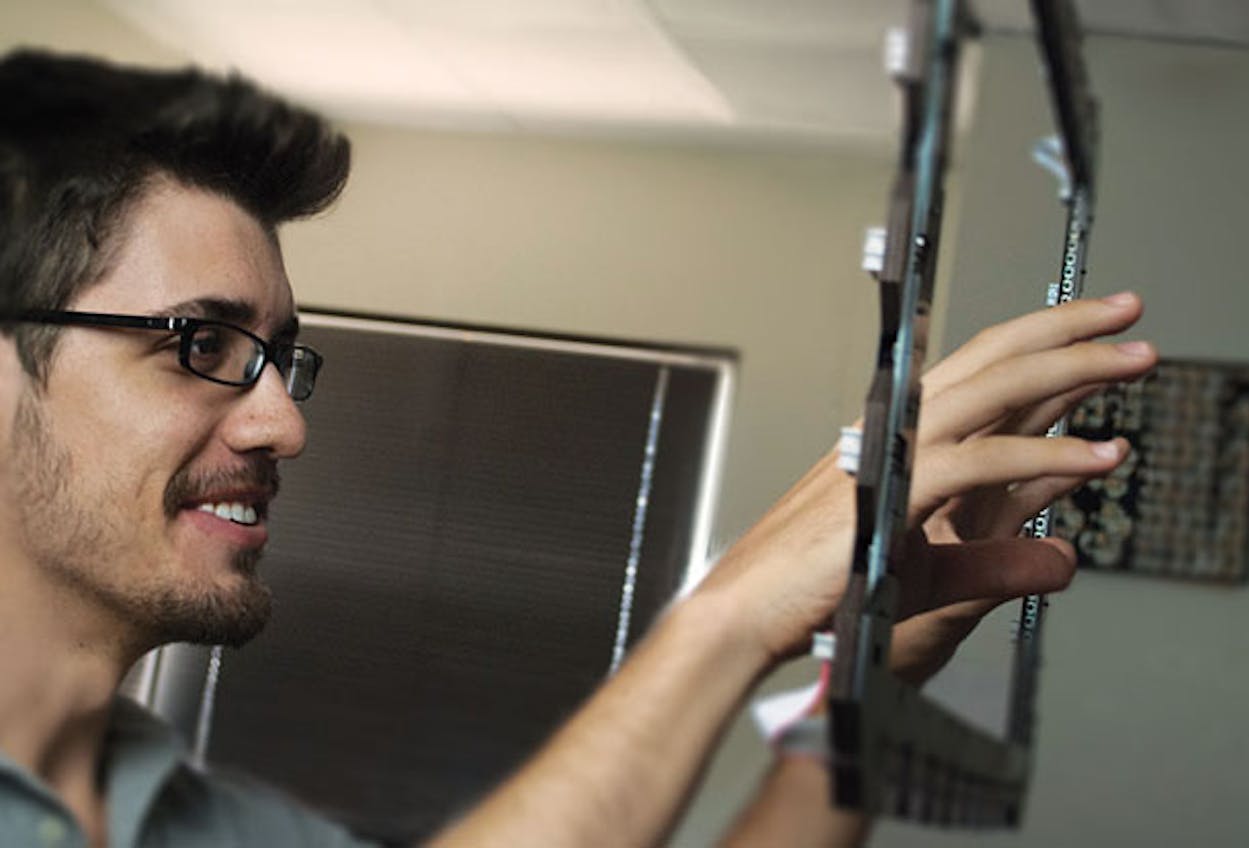Jon Moeller got an early start as an entrepreneur. By the time he started his graduate work in the computer engineering school at Texas A&M, he had already grabbed the attention of the tech community as an undergraduate with a touch-free computer screen called ZeroTouch. Moeller is the co-developer of ZeroTouch, a touch-free computer screen developed in the Interface Ecology Lab at Texas A&M University and supported by grants received from The National Science Foundation and Cypress Semiconductor. Jon works as a research assistant to Associate Professor Dr. Andruid Kerne, principal investigator for these grants and director of the Interface Ecology Lab.
ZeroTouch is a sensor that can track your hands and fingers in real-time. It looks like an empty picture frame, but that frame is filled with infrared LEDs and sensors that create a grid of invisible beams. When the beams are blocked by a finger or other object, the movement is tracked in real time, allowing the user to operate a computer interface simply by moving fingers through the air.
Moeller and his invention became enough of a sensation to land him a spot in a national Best Buy commercial. For a while, Moeller and ZeroTouch became an Internet sensation.
Unfortunately, the exposure didn’t translate into a successful business model.
“The multi-touch sensing market is highly cost-sensitive, and there are many players in the market,” Moeller explains. “I could see that the cost structure of the ZeroTouch technology wouldn’t place it in a competitive position in the mass market, and I didn’t have a technical team behind me to help put together the right pieces for the markets that were willing to pay top dollar.”
Moeller’s story isn’t unusual. Most people only hear about successful startups, while the unsuccessful ones go unnoticed. And even when new businesses do get off the ground, little light is shed on the struggles it takes to see an entrepreneurial effort come to fruition. In many cases, new business owners have to reinvent and redirect themselves in order to meet challenges as they arise. The problem is that many don’t have the financial support or time to do that. Moeller was able to have both by joining a business accelerator at his university called Startup Aggieland.
Business accelerators – also known as startup incubators or seed accelerators – have cropped up around the country. Many are independent for-profit organizations and some are non-profits, many of which are established on university campuses. They all have a common goal: to create successful businesses out of new ideas.
Startup Aggieland launched at Texas A&M in January with the mission to help students with businesses or strong business ideas to develop further. It offers students a variety of free resources, and was designed and is run by other students who both advise fellow student entrepreneurs while gaining their own business experience. The students receive guidance not only from their peers, but also from Texas A&M staff and faculty members and entrepreneurs from the local area and beyond.
With the help of the incubator, Moeller has taken his talent and the knowledge gained in the ZeroTouch venture and launched a new business around a product he calls “freeSoC,” also developed at Texas A&M’s Interface Ecology Lab. He occupies a rent-free office space at the startup where he works to market freeSoC, which is a microcontroller – a small, programmable computer – that can be used in combination with a variety of external devices to create interactive experiences. “It’s a platform for makers, hobbyists, artists, designers and anyone else interested in creating interactive objects or experiences,” Moeller says.
In addition to office space, Moeller enjoys the other perks of being a student entrepreneur at Startup Aggieland: “They’re providing me with advisorship, connections with other businesses, and they have a host of resources to help small startups overcome some of the roadblocks along the way.”
A year of free webhosting, compliments of Startup Aggieland’s strategic partner, San Antonio-based company Rackspace, is offered to each student entrepreneur, a benefit that Moeller insists saves him upwards of $20,000. After graduation, Moeller hopes to move his burgeoning tech business to New York City and says the knowledge and connections he’s gained at Startup Aggieland will help him make the transition.
He says in moving from the ZeroTouch whirlwind into his new venture, the greatest lesson he learned “is that passion is key when starting a business. I could sense my enthusiasm for ZeroTouch waning, which some may find surprising given its popularity. After choosing to move on to something else, it was like a huge weight had been lifted from my shoulders. It’s much easier to deal with the inevitable stresses of running a business when you really care about what you’re doing.” It also helps to have all the support and guidance you can get.
This story was researched and written by Lesley Henton, Communications Specialist, Texas A&M University. No member of the Texas Monthly editorial staff was involved in its production. For more information about sponsor content, see our FAQ.
For more information about Startup Aggieland and to read other entrepreneurship stories, visit Texas A&M or follow @TAMU on Twitter.






